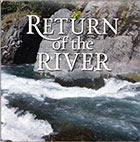
Return of the River 2014
Distributed by Collective Eye Films, 2305 SE Yamhill Street, Suite 101, Portland OR 97214; 503-232-5345
Produced by Jessica Plumb for Elwhafilm LLC
Directed by John Gussman & Jessica Plumb
DVD , color, 71 min.
Jr. High - General Adult
Activism, American Studies, Environmentalism, Native Americans
Date Entered: 03/31/2015
Reviewed by Cliff Glaviano, formerly with Bowling Green State University Libraries, Bowling Green, OHTwo dams on the Elwha River provided hydroelectric power for Olympic Peninsula settlements as well as power for the massive Crown-Zellerbach pulp and paper mill in Port Angeles, WN. The first dam, completed in 1913, was a project of Thomas Aldwell, author of Conquering the Last Frontier (1950), who along with his contemporaries, felt that nature was to be tamed to benefit industry and the settlers of the new West. A second dam eight miles upstream became operational in 1927. In both cases, the rights of Native Americans, the Lower Elwha Klallam People, were ignored. The salmon runs that supported many canneries in addition to the Lower Elwha Klallam civilization declined severely from 1927 through the 1980s. From the mid-1950s to the passage of the Elwha River Restoration Act (the Act) in 1992, it was illegal for the Native Americans to fish their traditional waters to harvest the Pacific salmon that were the basis of their subsistence, indeed, their civilization. By the 1990s, the few hundred salmon and steelhead that ran the Elwha to the lower dam were not sufficient to support a traditional Klallam lifestyle even if the fish could have been harvested.
Though the Elwha River Restoration Act denied the renewal of licenses for the dams, it did not provide sufficient funding for dam removal or the means of supplying the electrical needs of Crown-Zellerbach, other industries and municipalities. The final Environmental Impact Statement related to the Act indicated that removal of both dams was necessary to restore the Elwha ecosystem. A partnership of National Park Service, Bureau of Reclamation, Lower Elwha Klallam Tribe, local and state government and non-governmental interests was formed and continues to implement the reclamation plan. Federal government purchase of the dams in 2000 enabled the partnership to begin planning for dam removal and restoration. Dam removal began in 2011 and was completed in 2014. The film takes a well balanced approach to telling a complicated story regarding changing political and historical perspectives on the environment. For instance, the impact of the salmon spawning cycle in restoring nutrients to the entire ecosystem has only recently been fully appreciated by fisheries scientists. The early history of the ecosystem includes vintage images of the Klallam people, of logging, fishing and canning industries, and of dam building, enhanced by a reenactment of the building of the lower dam. The cinematography and editing are exceptional from underwater views of salmon, to dramatic views of the demolitions of the dams, to the bleak landscape of sediments left above the dams, to the hard work of replanting native plants to complete the restoration.
Return of the River is highly recommended for telling a complicated tale of environmental activism, community education, and intergovernmental cooperation in a clear and caring manner. The cinematography and editing create a vehicle that allows the viewer to empathize with the communities involved and the care in which the various interests of the Native Americans, industries, municipalities, the National Park Service and other governmental organizations came to an agreement that benefitted all parties as well as a commitment to returning the Elwha to as near its natural state as possible. The actions of those involved in agreeing to restore the Elwha River watershed may provide a workable template for other restorations. In addition, the film is dramatic, moving, and not to be missed.
Awards
- Gold Jury Prize, Social Justice Film Festival 2014
- Audience Choice Award Best Feature Documentary, Port Townsend Film Festival 2014
- Best International Documentary, Kuala Lumpur Eco Film Festival 2014
- Audience Choice Award, Friday Harbor Film Festival 2014
- Winner, Adventure Film Festival 2014